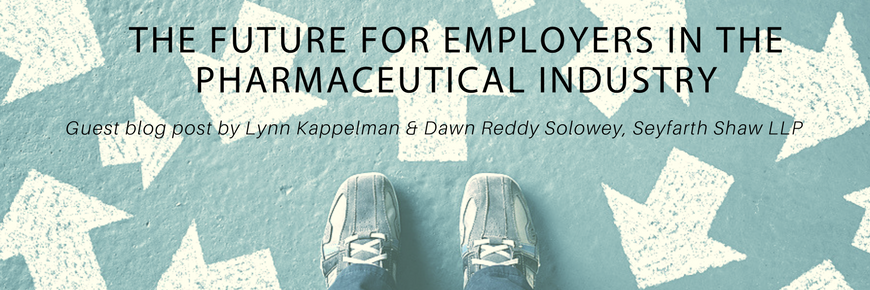
Innovations such as artificial intelligence, big data, and the sharing economy are transforming the way that pharmaceutical employers manage their workforces. Our firm, Seyfarth Shaw LLP, is studying the opportunities and challenges these changes create for our clients, to help them navigate these waters. This article discusses some of the challenges that these innovations create for employers in the pharmaceutical industry.
Artificial Intelligence
One of the changes revolutionizing the pharmaceutical industry is the productive use of artificial intelligence. Robots (“bots”) are performing many of the repetitive tasks that humans have historically performed. “Bots” are researching in labs: filling beakers, running tests and creating slides. “Bots” also perform manufacturing tasks and dispense drugs. Many companies are anxious to use robots in all phases of pharmaceutical commerce because they are more efficient and precise than humans, and can significantly reduce the number of manufacturing and research errors. Pharmacies can now be automated to mechanically process and distribute medications.
The benefits of this trend are that “bots” can work longer hours, without causing the company to incur “overtime pay,” and can be programmed to understand many different languages, facilitating global use and collaboration. Similarly, 3D printers in pharma manufacturing are growing increasingly sophisticated and can “print” drugs more quickly and more consistently than humans or many historical manufacturing processes.
While it is true that as a result of all of this technology, pharma employers are hiring fewer human employees in traditional research and manufacturing jobs, they must necessarily hire more employees with different skills to build, program and maintain the “bots” and 3D printers. Whereas pharma companies’ competitors for talent were historically research institutions and other pharma companies, pharma companies are now competing for programmers with tech industry companies.
As a result, demand for computer-savvy employees has skyrocketed. Recruiters and lawyers must now focus on providing the benefits and compensation programs to which these gig economy employees have become accustomed. There is also a greater need for non-compete agreements and trade secret/confidentiality agreements with these skilled technology employees to protect pharma companies’ confidential and proprietary programming and code.
Big Data
Another change affecting pharma employers is the ability to gather and mine “big data” for patterns and guidance. While big data is creating groundbreaking breakthroughs in scientific research, it is also creating many new legal challenges for employers.
Pharmaceutical companies can now gather and study big data to determine the effect of drugs on various target diseases, and can study the spread and treatment of disease across the globe. For example, many companies are experimenting with ingestible sensors and wearable technology that can mine each human subject for data about the subject’s health and well-being, as well as the effect of certain drugs on the subject. Such advances are creating a move toward precision medicine through pharmacogenomics. Augmented Reality (“AR”) will provide patients with detailed images of how certain drugs actually affect their bodies. Individuals will be able to download healthcare applications to monitor these effects on their mobile devices.
There is tremendous potential here: one can imagine how effective it would be to study a drug’s effect on one subject over time and then study the data on all of the subjects using the wearable or ingestible technology globally. Scientists are making great discoveries by using “predictive analytics” with algorithms or statistical models.
However, significant privacy issues arise from this new and exciting innovation. All of this private and personal medical information is now available about each human subject. Where should it be kept? How long should it be kept? Who should have access to the information? Can it be used for marketing purposes? What decisions can we make based on this treasure trove of personal medical information? Can the company be sued if someone uses this medical information improperly?
Recognizing these issues, the state of Illinois recently introduced a biometric information privacy law designed to protect the use of troves of big data and personal medical information. Indeed, such biometric privacy laws have been the basis of some class actions in recent months.
Bottom Line
The bottom line is that embracing these innovations creates great opportunities, but also creates considerable legal and business risks that companies must manage. Sophisticated businesses with an eye on long-term success should consider these issues now to make sure they are adequately prepared for the risks associated with the gig movement.
To receive Future Employer updates from Seyfarth Shaw, subscribe to the Seyfarth Shaw LLP blog.
Dawn Solowey, Senior Counsel at Seyfarth Shaw LLP, contributed to this article.
Guest postings on the MassBio blog in no way represent the opinions or endorsement of MassBio or its officers, directors, employees, agents, and consultants. MassBio does not represent or guarantee the truthfulness, accuracy, or reliability of statements or facts posted under the Guest postings on the MassBio blog. MassBio accepts no liability for errors, omissions or representations. The copyright of guest content belongs to the author and any liability with regard to infringement or intellectual property remains with the author.